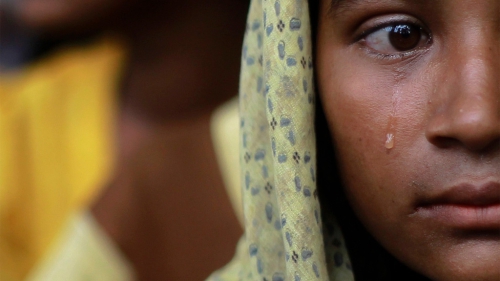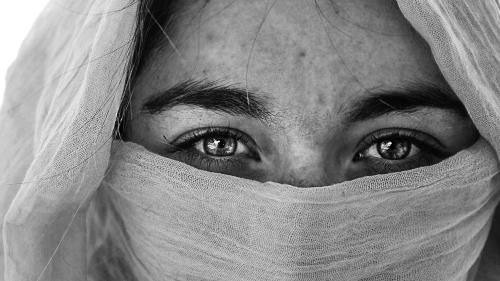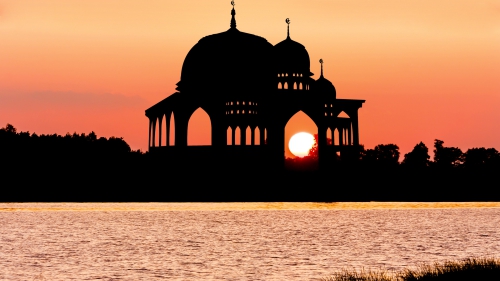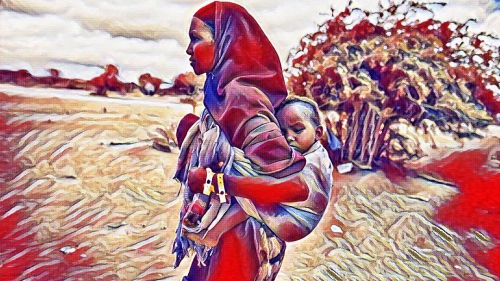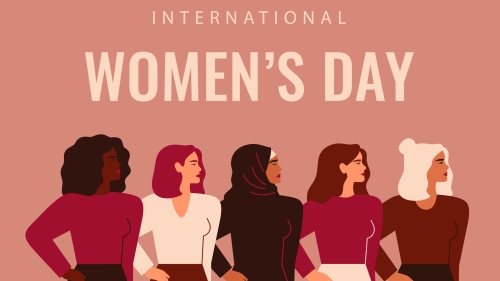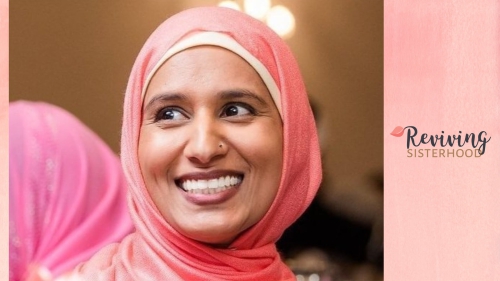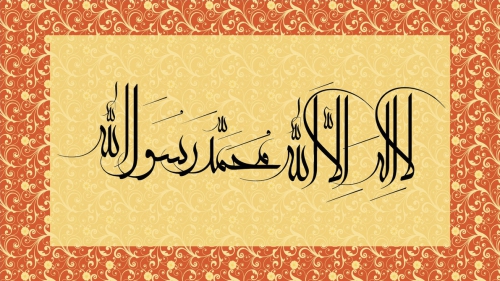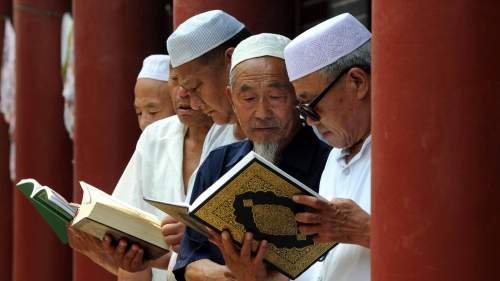Behind Bars and Beyond
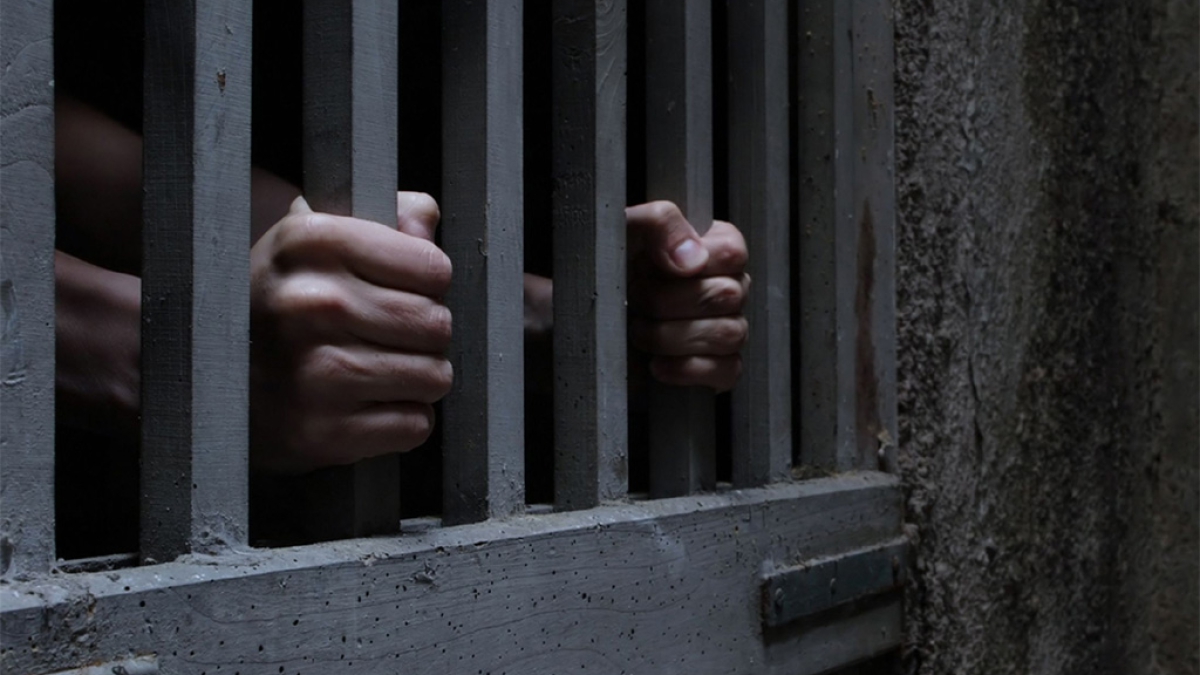
There are 2 million people incarcerated in the United States and tens of thousands of them are Muslim. The exact number is unknown as intake officers in many, but not all states, ask about faith to determine religious affiliation when prisoners enter the Department of Corrections system. One study, "From the Inside Out: Coming Home from Prison to the Islamic Faith," by Dr. Jen'nan Ghazal Read and Mustafa Dohadwala, claims that approximately one inmate in every five is Muslim. Of the 14,000 prisoners in the Riker's Island in New York, about 25 percent of them are Muslim men, and at the Rose M. Singer Center, the women's correctional facility on Riker's Island prison, 192 women identify themselves as Muslim.
That there are any Muslim women imprisoned in the US at all is a surprise to many. However, prison provides an opportunity for self-reflection and is often the catalyst for some incarcerated women to embrace Islam. Little information is available on Muslim female prisoners since studies exploring the Muslim prison population in the US focus primarily on men. As a result, there is a shortage of support services specific to incarcerated Muslim women. Those who study or work with imprisoned and recently released Muslims state these women face major concerns including child care, Muslim prison chaplains, housing, employment, counseling, religious classes and transitional assistance. Here, Azizah looks at help offered to Muslims behind bars and those released beyond.
Choosing Islam
"I could not have made it without Islam. It gave me spiritual strength and uplift at a time when I was extremely depressed in prison." - Formerly incarcerated Muslimah
Imam Umar Abdul-Jalil, Executive Director of Ministerial and Volunteer Services for all correctional institutions in New York City, asserts that while some incarcerated women take shahadah, the majority of Muslim women on the inside make a "re-declaration of the shahadah." This is especially true of repeat offenders. Some experts place the Muslim recidivism rate at 66 percent, the same as the national rate for the general prison population. Others conclude markedly lesser rates, as low as eight percent.
Women prisoners have access to a variety of faith practices while incarcerated and many practice other religions before embracing Islam in an attempt to create spiritual sanctity in their lives. Imam Umar states, "Religion creates balance in the human being, whether in prison or outside of prison."
It is this balance that offers many of these women spiritual strength while in prison and during their transition from prison. Scholars Ihsan Bagby and Lawrence Mamiya's study on community reentry programs sponsored by African American Muslim Mosques for formerly incarcerated Muslims quotes a former female inmate as saying, "Prayer is necessary for me. Prayer reminds me who I am. I fast on Thursday-fasting helps me not to complain."
Along with the spiritual empowerment Islam grants Muslim women prisoners come the sisterly bonds and support amongst incarcerated Muslimahs. A former inmate, Ameera,* states these bonds, "help to build strength and faith while you're dealing with the trauma of being locked up." Aisha Muhammad, administrative chaplain at Singer points to another beneficial factor-hijab. Women wearing hijab at Riker's Island and in the maximum security prison at Bedford Hill, New York, find that being identifiably Muslim has served as a protection against sexual abuse and assault. However, in places where the staff and inmates are unfamiliar with Islamic traditions, hijab can bring mistreatment and ridicule, vividly demonstrating the need for more Muslim chaplains.
Children
"My children were taken by the foster care system in 1985... I don't know where they are now. I just gave them up. They needed a better life than I could give them. It's been a torment ever since." - Fatima, formerly incarcerated Muslimah
Figures from the US Department of Justice tell us about 75 percent of incarcerated women are mothers. Women who give birth while incarcerated have their children taken away and seldom exercise control over care-placement of the child. Over 60 percent of mothers in prison are incarcerated more than 100 miles from their children, making regular visitation expensive and difficult. The average stay for a woman at Singer is 45 days, during which time, Aisha Muhammad explains, "a woman will lose her job, apartment and children to Department of Child Welfare. A couple of months in jail can change her life drastically."
Most women report that family members care for their children while they are incarcerated. But for those without familial support there is no assurance her children will be cared for according to her requests and the possibility of losing a child- permanently or temporarily-to the foster care system poses a serious concern for women in prison. Aisha notes, "We need to seriously think about social services that will accommodate the needs of the Muslim women and men whose children are placed in foster care while they are incarcerated so that the children can be placed in Muslim homes."
Chaplaincy and Organizational Interventions
"People need to be helped before they go out-pre-release. Muslims need to be present more in prisons." - Formerly incarcerated Muslimah
Other religious communities have a longer history of offering support services to women prisoners and oftentimes extend their services to incarcerated Muslimahs. Now, several commendable prison programs run by Muslim organizations offer assistance through on-site Qur'anic study and prayer classes, Islamic materials, emotional counseling, and focus on transformative lifestyle practices. Still, programs serving Muslim women are lacking. One inmate reports to Azizah that they receive Islamic materials from Muslim inmates in a neighboring male institution, often their only resource.
Shortage of support services coupled with small numbers of qualified Muslim prison chaplains nationally, makes the role of existing Muslim prison chaplains that much more vital to the stability of incarcerated Muslim women. Khadija Athman, Civil Rights Manager at CAIR's headquarters in Washington, DC states, "At least 50 percent of the prison grievances [received at CAIR] could be solved if we actually had enough Muslim chaplains working in the system. "
Khadija began working with CAIR as a volunteer in 1998, and single-handedly initiated the program in 2002, responding to prisoner complaints and mediating on their behalf. The program is not equipped to handle wrongful accusation grievances; however, they do intervene when a Muslim's rights regarding the pertinent practice of Islam are violated. "I just decided, let me see how I can work this out, because it wasn't right that we had all of these complaints and were not addressing them. "
Today, Khadija spends 80 percent of her working hours on prison cases. Her initiative has grown to include records of most states religious policies- especially with regard to Muslims. Khadija's selfless efforts have developed a productive system of handling prison complaints from CAIR's 30 nationwide chapters and established administrative contacts within several prisons and state corrections departments. "Somehow, alhamdulillah, word has just spread that you can write to CAIR," Khadija comments, humbly. Last summer she assigned CAIR interns the task of designing a model prison policy that will, when complete, be lobbied to the Department of Corrections. "Of course, it's far-fetched that they will adopt it," she says, "but, it's a start."
Khadija says that the general complaint she receives from Muslimahs is regarding hijab, permission to cover and requirements to remove their scarves for visits. Many complaints of female prisoners are the same as male prisoners, such as holding Jumu'ah prayer or having a Qur'an. But Khadija notes gender discrepancy complaints as well. "One complained that at the male institution the Muslim inmates are allowed to have Eid feast where people can bring food from outside," she says, "whereas they [the women inmates] are not allowed to get their feast brought in from outside." Another complaint revealed that "the neighboring [male] institution, was allowed an hour for Jumu'ah, whereas females only have half an hour. An increase in Muslim advocates within the prison will serve to decrease the number of these and other grievances.
One of those advocates is Motisola Abdallah. She has been the Victim/Women's Advocate for Muslim women in the Louisiana Correctional Institute for Women for the last five years and has written to the warden, the governor, various lawyers and even to the White House on behalf of a Muslim woman who endured abuse because of her hijab after September 11th . "If we get negative comments, we can retreat to our homes, but inmates have nowhere to run, " she declares with passion.
In late May, the Supreme Court ruled that any states receiving federal money for prisons can not "impose a substantial burden on the religious exercise of a person residing in or confined to an institution" without demonstrating compelling reasons.
Commenting on the ruling, Motisola states, "What's on paper is not what's being implemented because there is no one there to advocate for the prisoners."
Masjid Prison Initiatives
Prior to the increase in arrests and detainment of Arab and Middle Eastern Muslims following September 11th, attention to prison services and reform was mostly by African American Muslim communities. The Read/Dohadwala study cites African-American masajid as "most likely to take part in prisoner rehabilitation programs (81 percent), followed by Arab mosques (60 percent), and Asian mosques (43 percent)." It also pinpoints racial disparity as a factor in prison da'wah efforts, both on a volunteer level and as a deterrent for masajid working together to build prison programs.
Despite these intercultural challenges, many successful masjid-run prison efforts exist and suffer only due to the lack of consistent volunteers. Khadija Athman contends she receives complaints that in some institutions, Jumu'ah may not have been held for three months for lack of volunteers. She points out that a late program leader or volunteer may result in the cancellation of an event which can be very disappointing to inmates. "What we encourage is for Muslims to volunteer their time to conduct Jumu'ah services, to conduct ta'lim services," Khadija says, "and once they have volunteered to be dedicated, to make it a priority that I gave my word as a Muslim and therefore have to follow it."
Another difficulty faced by masajid in recruiting volunteers is the reputation of incarcerated and recently released persons as dangerous and untrustworthy. This stigma is prevalent in most societies and is no less evident in the Muslim American community. Imam Umar suggests that, in the case of Muslim women prisoners, "we have to assist them as opposed to guilt-trip them." Motisola agrees about being judgmental and also warns against the purposeful neglect, "Muslims on the outside forget about those on the inside, but they are still part of our community."
Employment, Housing and Counseling
Community Based Opportunities, including housing, job placement, job referral, substance abuse services (outpatient and residential, and reunification services are available to all incarcerated women. Additionally, Muslim women are offered referral service to community masajid and sometimes to Muslim physicians. However, when it comes to employment and housing, the stigma of incarceration places serious barriers on Muslim women. "When you have been incarcerated, it all too often leaves a mark that hampers your ability to get a job," stated Aisha Muhammad.
Many programs offer informal temporary housing in the masjid or with a Muslim family. The Islamic Society of Greater Houston even has a toll-free number that recently released Muslims can use to find Muslim volunteers in the city where they are returning. Oftentimes, lack of funding and resources is a major obstacle for building and sustaining half-way houses. There are similar difficulties with developing job placement services, however, some communities boast programs that place recently released Muslims in jobs at Muslim-owned companies and others offer computer courses and other skills useful in job searches.
Other programs seek to institute services for individual and family counseling, religious classes, living skills, martial arts and Arabic classes. Such holistic approaches to support services are increasing. Gloria Muhammad is developing her organization, Women Overcoming Maladaptive Behaviors, (W.O.M.B.) as a "comprehensive center that not only addresses immediate needs but also lifestyle choices." W.O.M.B offers Pilates and vegetarian cooking classes alongside counseling and practical aid to all women at-risk, with special days for Muslimahs. Gloria states it is important that support incorporates "those things that can help heal the body and bring it back into balance with every aspect of your being."
Masjid and Community Support
"I learned a lot of discipline from Islam, but Muslims are as vulnerable as anyone else." - Formerly incarcerated Muslimah.
Most women cite support from the masjid and community members as instrumental in their success with transition. Nafisa shared her struggle, "Staying with non-Muslim friends led me back to getting high and shop lifting, but when I started attending the masjid, all that stopped. It was important to have someone to talk to." In the Bagby/Mamiya study, Rashidah* refers to her community masjid as an "extremely important" part of her successful transition, stating, "It was the only place I could turn to that understood my being a Muslim.
In urban centers, Muslims are forming social service organizations to address the concerns of formerly incarcerated Muslims. The Crescent Social Assistance Agency in Newark, New Jersey has a full time, professional staff for those in need and the Islamic Society of Greater Houston and Masjid Al-Islam in Connecticut both have successful prison da'wah programs. In the Atlanta area, Baitul Salaam, a women's shelter for abused women provides invaluable services and Motisola Abdallah is establishing a nationwide newsletter for incarcerated Muslim women, a forum for their voices and needs.
As more of us understand the spiritually nourishing role that Islam plays in the lives of Muslim women in US prisons, the more the Muslim community at large will seek to provide for the needs of prisoners. Aisha Muhammad points out that, "As in the time of Rasulullah, peace be on him, we are not only here to service Muslims, but humanity as a whole." Insha'Allah, more information will heighten our awareness about the sizeable segment of the Muslim American population imprisoned-most of whom are men-but some of whom are women, our sisters in Islam.
"It's not that difficult or deep," Motisola reminds us. "We could simply send things they need-money, stamps, scarves, or even a dollar card that says, 'I'm thinking of you.'"
*Name changed for reasons of privacy.
Source Azizah Magazine - A unique publication that presents the issues, accomplishments and the interests of Muslim women in North America.
50% discount for IslamiCity Members.
To subscribe Click Here
Related Suggestions
from the inner walls to the outer (invisible) walls. Is there a pen
pal program, or e-mail group?
In the name of Allah the Beneficient the Merciful,
I write in defense of the brothers who wore the suit of the Nation of Islam, & in particular of the sisters in white, blue, brown and other forms of what we knew and know as 'the garment.'
For years, so many sisters took harassment & the brunt of being 'Black Muslims,' 'Nationalists,' 'Black Moslems,' and other followers of 'the hate that hate produced.' In addition, they took jibes from their own Afro/Black communities for avoiding pork, alcohol, cigarettes, the Arabs in their neighborhoods, & for fasting to avoid Christmas.
More importantly, they have watched their men drop out of Islam, or leave its representation to the elderly & those few bold enough to proclaim their 'holy' names (Muhammad, Shabazz, Karim and other names given by the late Honorable Elijah Muhammad).
Considering that under this form of Islam, as we knew it, families cleaned up - though sisters were subjected to God in the persons of their male relatives - it is no wonder that many Muslim African/Afro/Black women are militant in bearing & action. Nor is it shocking that as men dropped out of open representation of Islam, the Black community has split apart.
As the recognizable male presence of the Nation has diminished, the trademark beard of eastern oriented Muslims has become a source security for many Black Muslim women. I don't know if they are sunni, shi'ah, ismaili, ahmadiyya or following other taditions, but the beards seem to be a proclamation of Islam as obvious as the scarves and kufis worn by multiple Muslim and former Muslims.
Inshallah, Muslims who consider themselves 'strict,' and 'Orthodox' will revitalize Islam in North American Black communities by explaining it in terms of the struggles for African identity that made Islam popular.
The comment was posted for another artcle; but it seemd relevant to this one as well.
Masalaam
Would like to speak to the writer's or researcher's of this article to offer some information on the status of Muslim Women Prisoner's in America. I was detained in 2003, and would like to offer any info I could, including what's most do not know, and what most aren't aware of. I have an ongoing legal battle, that has not ended since I was released. I was detained in Boston, MA USA. As well, if any other Muslim women were detained I would like to be in contact with them. You may contact my email: [email protected].
Mary Souda
I would love to share a little known fact with the readers of this article. All African Americans have not been in prison and All African Americans did not accept Al-Islam in prison. You may ask yourself why would I make such a statement. Just look at some of the magazine articles and videos that you see about people accepting Al-Islam. You will see the testimonies from Caucasians, Hispanics, and other groups who are in education, business, medicine, science etc. When they interview the African American he is either in prison or recently released from prison. Now, I know this is not all the time but I'm seeing this pattern too often and these materials are produced by Muslims. We need to have balance and fairness in our approach to these matters. If you believe that all "races" of people are represented in the prison population and all races of people are represented in the fields of education, business, medicine and science then shouldn't we see the manifestation of this diversity when we broadcast in the print or visual media. Dear Muslims we can't be the architects of stereotypes. Sterotypes occur when you can find a problem in a small percentage of a group then sensationalize it(media) enough to make others think that it applies to the whole group. And, the whole time the constant use of media articles, videos etc. of problems in a small percentage of a group helps to validate a stereotype that may dwell in your mind. This is an attack by Shaitan on our minds and it plays out in our relationship with one another.
As-Salaamu Alaikum
Siddiq
African American
Board Member of a Non-Profit Organization that provides transitional housing for ex-offenders and housing for those in need.






